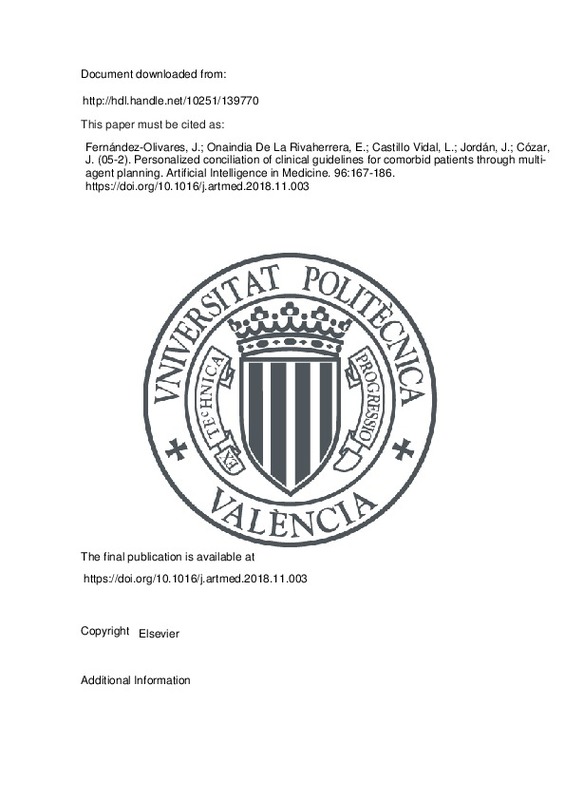JavaScript is disabled for your browser. Some features of this site may not work without it.
Buscar en RiuNet
Listar
Mi cuenta
Estadísticas
Ayuda RiuNet
Admin. UPV
Personalized conciliation of clinical guidelines for comorbid patients through multi-agent planning
Mostrar el registro sencillo del ítem
Ficheros en el ítem
| dc.contributor.author | Fernández-Olivares, Juan
|
es_ES |
| dc.contributor.author | Onaindia De La Rivaherrera, Eva
|
es_ES |
| dc.contributor.author | Castillo Vidal, Luis
|
es_ES |
| dc.contributor.author | Jordán, Jaume
|
es_ES |
| dc.contributor.author | Cózar, Juan
|
es_ES |
| dc.date.accessioned | 2020-03-30T07:22:09Z | |
| dc.date.available | 2020-03-30T07:22:09Z | |
| dc.date.issued | 2019-05 | es_ES |
| dc.identifier.issn | 0933-3657 | es_ES |
| dc.identifier.uri | http://hdl.handle.net/10251/139770 | |
| dc.description.abstract | [EN] The conciliation of multiple single-disease guidelines for comorbid patients entails solving potential clinical interactions, discovering synergies in the diagnosis and the recommendations, and managing clinical equipoise situations. Personalized conciliation of multiple guidelines considering additionally patient preferences brings some further difficulties. Recently, several works have explored distinct techniques to come up with an automated process for the conciliation of clinical guidelines for comorbid patients but very little attention has been put in integrating the patient preferences into this process. In this work, a Multi-Agent Planning (MAP) framework that extends previous work on single-disease temporal Hierarchical Task Networks (HTN) is proposed for the automated conciliation of clinical guidelines with patient-centered preferences. Each agent encapsulates a single-disease Computer Interpretable Guideline (CIG) formalized as an HTN domain and conciliates the decision procedures that encode the clinical recommendations of its CIG with the decision procedures of the other agents' CIGs. During conciliation, drug-related interactions, scheduling constraints as well as redundant actions and multiple support interactions are solved by an automated planning process. Moreover, the simultaneous application of the patient preferences in multiple diseases may potentially bring about contradictory clinical decisions and more interactions. As a final step, the most adequate personalized treatment plan according to the patient preferences is selected by a Multi-Criteria Decision Making (MCDM) process. The MAP approach is tested on a case study that builds upon a simplified representation of two real clinical guidelines for Diabetes Mellitus and Arterial Hypertension. | es_ES |
| dc.description.sponsorship | This work has been partially supported by Spanish Government Projects MINECO TIN2014-55637-C2-2-R and TIN2015-71618-R. | es_ES |
| dc.language | Inglés | es_ES |
| dc.publisher | Elsevier | es_ES |
| dc.relation.ispartof | Artificial Intelligence in Medicine | es_ES |
| dc.rights | Reserva de todos los derechos | es_ES |
| dc.subject | Clinical guidelines | es_ES |
| dc.subject | Comorbidities | es_ES |
| dc.subject | Conciliation | es_ES |
| dc.subject | Patient preferences | es_ES |
| dc.subject | HTN planning | es_ES |
| dc.subject | Multi-agent planning | es_ES |
| dc.subject.classification | LENGUAJES Y SISTEMAS INFORMATICOS | es_ES |
| dc.title | Personalized conciliation of clinical guidelines for comorbid patients through multi-agent planning | es_ES |
| dc.type | Artículo | es_ES |
| dc.identifier.doi | 10.1016/j.artmed.2018.11.003 | es_ES |
| dc.relation.projectID | info:eu-repo/grantAgreement/MINECO//TIN2015-71618-R/ES/PLAN MINER:INTEGRACION DE PLANIFICACION AUTOMATICA Y MINERIA DE PROCESOS PARA EL APRENDIZAJE DE DOMINIOS DE PLANIFICACION JERARQUICA A PARTIR DE LA EXPERIENCIA ALMACENADA EN R/ | es_ES |
| dc.relation.projectID | info:eu-repo/grantAgreement/MINECO//TIN2014-55637-C2-2-R/ES/GESTION DE METAS PARA AUTONOMIA A LARGO PLAZO EN CIUDADES INTELIGENTES/ | es_ES |
| dc.rights.accessRights | Abierto | es_ES |
| dc.contributor.affiliation | Universitat Politècnica de València. Departamento de Sistemas Informáticos y Computación - Departament de Sistemes Informàtics i Computació | es_ES |
| dc.description.bibliographicCitation | Fernández-Olivares, J.; Onaindia De La Rivaherrera, E.; Castillo Vidal, L.; Jordán, J.; Cózar, J. (2019). Personalized conciliation of clinical guidelines for comorbid patients through multi-agent planning. Artificial Intelligence in Medicine. 96:167-186. https://doi.org/10.1016/j.artmed.2018.11.003 | es_ES |
| dc.description.accrualMethod | S | es_ES |
| dc.relation.publisherversion | https://doi.org/10.1016/j.artmed.2018.11.003 | es_ES |
| dc.description.upvformatpinicio | 167 | es_ES |
| dc.description.upvformatpfin | 186 | es_ES |
| dc.type.version | info:eu-repo/semantics/publishedVersion | es_ES |
| dc.description.volume | 96 | es_ES |
| dc.relation.pasarela | S\375611 | es_ES |
| dc.contributor.funder | Ministerio de Economía y Empresa | es_ES |
| dc.contributor.funder | Ministerio de Economía y Competitividad | es_ES |







![[Cerrado]](/themes/UPV/images/candado.png)

